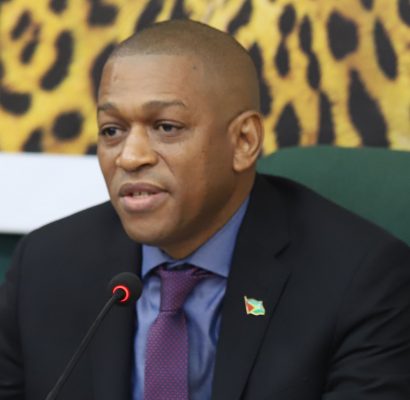Even as optimism abounds that Local Content can serve as “a key tool to help developing countries to reap, in a sustainable manner, the economic and social benefits from their natural resources” there exists a deep-rooted concern that if not implemented and managed carefully and if not subjected to public scrutiny, Local Content can offer “significant corruption opportunities,” according to an article published in the 2019 issue of the Georgetown Chamber of Commerce and Industry (GCCI) Souvenir Magazine.
The article authored by GCCI Technical Advisor Nazim Baluch makes the point about the potential for corruption on Local Content arrangements against the backdrop of what he says is “the increasing bribery and corruption threat for businesses and company executives and firms operating in the oil and gas sector which he says has “the highest risk of corruption of all sectors” and are “among those that have incurred the most significant penalties.”
Publication of the article in the 2019 issue of the Chamber’s official publication, Business Guyana, coincides with increased reporting on instances of bribery and corruption in the oil and gas sector internationally, much of it involving collusion between international oil companies and well-placed businessmen and political functionaries in oil-producing countries.

Baluch’s article alludes to a 2011 Bribe Payers Index report by Transparency International which identifies unnamed companies in the oil and gas sector as being “perceived to be more likely to bribe than those in other sectors……….With most oil and gas produced in Third World countries the industry is far more susceptible to the risk of corruption than other kinds of business,” the article asserts.
Publication of the Baluch article also comes close to disclosures in May this year that Guyana’s State Assets Recovery Agency (SARA) had launched a probe into whether corruption had played a role in the PPP/C administration’s awarding of oil blocks to two companies not previously known to be involved in the oil and gas sector, just days before ExxonMobil had broken the news of its first major oil find offshore Guyana. SARA had said at the time that the two companies, J.H. Associates and Mid Atlantic Oil and Gas had only been created around five years earlier and had not been known to be active anywhere else in the worldwide oil and gas sector, a disclosure that gave rise to active speculation that well-placed officials in the previous political administration had abused their access to what at the time was not publicly-known information about Guyana’s oil find.
A matter of weeks ago the oil blocks ‘plot’ thickened when it was disclosed that a well-placed SARA official, Eric Phillips, who had been assigned an investigatory role in the questionable oil blocks deal under the previous political administration, had himself been part of a company that had applied for but failed to secure state approval for the allocation of an oil block in 2016. The disclosure led to Phillips tendering his resignation from SARA based on the conclusion that his private business pursuits amounted to “a serious conflict of interest” that could not be ignored if the integrity of the organization and its mission was to remain intact.
SARA had said that the oil blocks assigned under the previous political administration had gone ahead without public auction or parliamentary oversight and that there had been no consultation with the political opposition nor was there any signing bonus involved, alleged irregularities that led to concerns that laws were breached in the process.
In his article Balluch also alludes to a 2012 observation by Global Witness, an international NGO involved in investigating links between natural resource exploitation and corruption and which describes Local Content-related corruption as “even more damaging than one-off payments for contracts because it means revenues can be stolen from the state continuously and in a way that is much more difficult for an audit to detect”. Balluch goes on to state that “corruption in LC (Local Content) may provide disincentives to international companies to invest in such an environment and risk violating foreign bribery laws in their home countries.”
Commentators in the private sector and further afield continue to advocate for the official finalization of a Local Content Policy that makes clear precisely how both the local business community and the country as a whole will benefit. In April this year British High Commissioner to Guyana, Greg Quinn was reported as saying in another section of the media that there was an “urgency” to the emergence of a Local Content policy. “I think it’s actually important that that it gets delivered and produced quite quickly so that everyone knows, both on the international business side but also on the local company side.” Quinn is quoted as saying.
Earlier this year Head of the Department of Energy in the Ministry of the Presidency Dr. Mark Bynoe disclosed that up to the third quarter of last year the country had realized returns totaling some US$64 million from local content pursuits linked to the oil and gas sector. At the time he said that it was the highest amount since oil was first found here in 2015.
Public comments on Local Content and its relevance to the business community and to the country as a whole have been forthcoming from functionaries in a wide cross section of disciplines including the private sector, legal luminaries, academics and economists, each, in turn, emphasizing the importance of a policy that seeks, simultaneously, to maximize the across-the-board benefits to the country while safeguarding against the various forms of abuse and corrupt practices to which Local Content has been reduced, particularly in poor countries.




